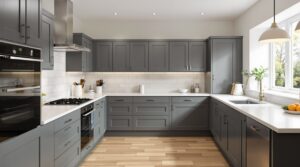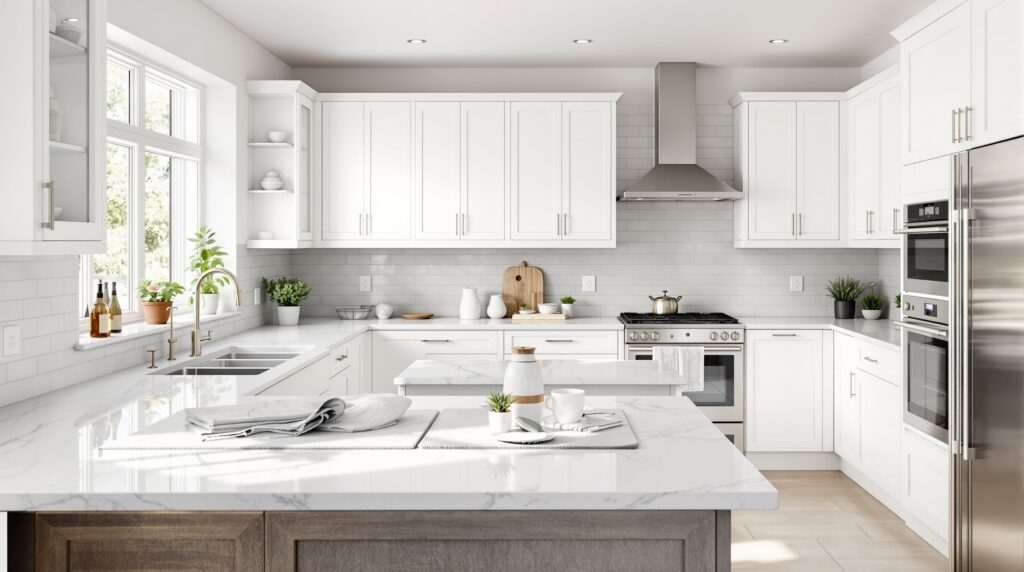Understanding how much it costs to renovate a kitchen is essential before you start planning your dream space and avoid costly surprises. Whether you’re a homeowner in Bromley looking to enhance your property value or a developer working on multiple projects across Kent, having a clear picture of kitchen renovation costs helps you make informed decisions and prevents budget overruns. The average cost to renovate a kitchen in 2025 ranges from £12,000 to £35,000 for mid-range remodelling dependent on scope, materials and location, but the final figure can vary dramatically based on your specific requirements and choices. Kitchen renovations represent one of the most significant investments you’ll make in your property, yet they consistently deliver excellent returns both in terms of property value and quality of life. The kitchen has evolved from a purely functional space into the heart of the modern home, where families gather, entertain guests, and create lasting memories. This transformation has elevated expectations for kitchen design and functionality, making thoughtful budgeting more crucial than ever. For homeowners across Kent and Bromley, understanding the nuances of renovation costs enables you to plan effectively, prioritise spending where it matters most, and work with skilled tradespeople like Kent Plasterers who deliver exceptional results within your budget parameters.
Understanding the scope of kitchen renovation costs
Kitchen renovation costs vary enormously depending on the extent of work required, and understanding these different levels helps you determine what’s realistic for your budget and property goals. The scope of your project fundamentally shapes every other decision, from contractor selection to material choices, and establishes the framework within which all subsequent planning occurs. Many homeowners underestimate the complexity involved in kitchen renovations, viewing them as straightforward cosmetic updates when in reality they often involve multiple trades, careful sequencing of work, and coordination of numerous elements to achieve a cohesive result. Whether you’re planning a simple refresh to modernise dated finishes or a complete transformation involving structural changes, accurately assessing the scope prevents unrealistic expectations and ensures your budget aligns with your vision. The key distinction lies between cosmetic updates that work within existing layouts and more comprehensive remodels that fundamentally reconfigure spaces, with each approach delivering different results at vastly different price points.
Minor kitchen updates and refreshes
Minor updates like refinishing cabinets or replacing appliances may cost under £10,000 and can deliver significant aesthetic improvements without major structural work. These projects focus on refreshing existing elements rather than replacing them entirely, making them ideal for homeowners who appreciate their current layout but want to modernise appearances or improve specific functional aspects. Cabinet refacing ranges from £10,000 to £40,000 depending on materials and kitchen size, offering a cost-effective alternative to complete replacement whilst dramatically transforming the room’s appearance. This approach involves replacing cabinet doors and drawer fronts whilst retaining the existing cabinet boxes, significantly reducing both costs and disruption compared to full replacement. Minor renovations might also include updating worktops, installing new taps and fixtures, replacing flooring, or adding a fresh coat of paint to walls and ceilings. Professional plastering work by specialists like Kent Plasterers ensures walls provide the perfect canvas for your refreshed kitchen, with smooth, flawless surfaces that enhance the overall finish. For homeowners on tighter budgets or those planning to sell within a few years, these strategic updates deliver excellent value by modernising appearances without the expense and disruption of complete renovation.
Mid-scale kitchen remodels

Mid-scale remodels are typically £15,000 to £50,000 and represent the most common renovation level for homeowners in Kent and Bromley. These projects strike an excellent balance between investment and transformation, typically involving replacement of major elements whilst potentially retaining some existing features in good condition. A small kitchen remodel averages £10,000 to £20,000 or up to £41,407 for extensive work involving layout changes and quality finishes that significantly enhance both functionality and aesthetics. Mid-scale renovations generally include new cabinetry, updated appliances, replacement worktops, new flooring, improved lighting, and professional finishing work including plastering and tiling. These projects might involve minor layout adjustments such as relocating appliances or removing non-structural walls to improve flow, though they typically work within the existing footprint to control costs. Quality plastering becomes particularly important at this level, as homeowners invest in finishes that will last for years and significantly impact daily enjoyment of the space. Kent Plasterers regularly works on mid-scale kitchen renovations throughout Bromley and Kent, ensuring walls are perfectly prepared for painting or tiling, with attention to detail that elevates the entire project. This renovation level appeals to long-term homeowners seeking to create their ideal kitchen without excessive expenditure, as well as developers looking to add substantial value to properties before sale.
Major and luxury kitchen renovations
Major renovations with custom cabinets and high-end finishes can cost £50,000 to £150,000 or more, particularly in larger properties or where architectural changes are required. These comprehensive transformations often involve reconfiguring layouts, removing walls, relocating plumbing and electrical services, installing premium materials throughout, and incorporating cutting-edge appliances and technology. Large luxury renovations in major cities such as Los Angeles frequently cost £30,000 to £100,000, with most common projects falling between £50,000 and £75,000 for truly exceptional results. High-end renovations distinguish themselves through attention to detail, bespoke elements, superior materials, and flawless execution across all trades. Custom cabinetry designed specifically for your space maximises storage and functionality whilst reflecting your personal style, whilst premium worktops in materials like Carrara marble or exotic granite create stunning focal points. Luxury projects often include features like integrated appliances, underfloor heating, sophisticated lighting systems with multiple zones, and architectural details that elevate the space beyond mere functionality. Professional plastering and wall preparation become absolutely critical at this level, as any imperfections become glaringly obvious against premium finishes and careful lighting design. Kent Plasterers brings the expertise and precision required for luxury renovations, understanding that in high-end projects, perfection isn’t optional but essential to achieving results that justify substantial investment.
Breaking down kitchen renovation costs by component
Understanding where your money goes in a kitchen renovation helps you prioritise spending and identify potential savings without compromising on quality. Kitchen renovations involve numerous distinct elements, each contributing to the overall functionality, aesthetics, and value of the finished space, and the allocation of budget between these components significantly influences both the renovation process and final results. By examining costs component by component, homeowners gain clarity about which elements represent the best investment for their specific needs and where potential economies might be achieved without sacrificing quality or longevity. This detailed understanding proves particularly valuable when working with contractors and making the inevitable compromises required to balance aspirations with budget realities. Rather than viewing your kitchen renovation as a single monolithic expense, breaking costs down into constituent parts enables more strategic decision-making and helps prevent the common mistake of overspending on less important elements whilst shortchanging crucial aspects that determine long-term satisfaction.
Cabinetry and storage solutions
Cabinets typically represent the largest single expense in kitchen renovations, accounting for approximately 30-40% of the total budget, with custom options significantly more expensive than semi-custom or stock alternatives. This substantial allocation reflects both the physical scale of cabinetry in most kitchens and the precision engineering required to create functional, durable storage solutions that withstand years of daily use. Stock cabinets offer the most economical option, with standard sizes and limited customisation but significantly lower costs, whilst semi-custom cabinets provide greater flexibility in dimensions and finishes at moderate price premiums. Custom cabinetry delivers exactly what you envision, built to precise specifications for your space, but commands premium pricing that can stretch budgets considerably. Cabinet quality varies enormously, from basic particleboard construction with veneer finishes to solid hardwood throughout, with corresponding differences in durability, appearance, and cost. Interior fittings and organisational systems substantially enhance functionality but add to overall cabinet costs, making it important to prioritise features that genuinely improve your kitchen workflow rather than pursuing every available option. When working with Kent Plasterers on your kitchen renovation, coordinating plastering work with cabinet installation ensures perfect integration between built-in elements and wall surfaces for professional results throughout.
Appliances and fixtures
New appliances typically add £5,750 to £11,500 to the budget, with premium brands and integrated options pushing costs higher but adding considerable value and functionality to your kitchen. The appliance package usually includes refrigeration, cooking appliances (oven, hob, and possibly separate grill or microwave), dishwasher, and extraction, with each category offering options from budget-friendly to professional-grade equipment. Integrated appliances that sit flush with cabinetry create sleek, streamlined aesthetics particularly valued in contemporary kitchens, though they generally cost 20-30% more than freestanding equivalents. Energy efficiency ratings significantly impact long-term running costs, making it worthwhile to invest in higher-rated appliances that reduce utility bills over their operational lifetime whilst also supporting environmental sustainability. Kitchen taps and sinks represent smaller but still significant expenses, with quality fixtures ranging from £200-£1,500 depending on materials, finishes, and features like boiling water taps or sophisticated spray options. Coordinating appliance installation with other trades ensures proper provision for electrical connections, water supply, drainage, and ventilation, all of which require careful planning and professional execution to avoid costly remediation later.
Worktops and surfaces
Worktop materials range from affordable laminate to premium granite, quartz or marble, with costs varying from £100 to £500 per square metre depending on material choice and installation complexity. Laminate offers the most economical option with surprising variety in colours and patterns, whilst engineered quartz provides durability, consistent appearance, and low maintenance at mid-range pricing. Natural stone including granite and marble delivers unique, luxurious aesthetics with inherent variations that many homeowners prize, though these materials require more maintenance and careful sealing to prevent staining. Solid surface materials like Corian offer seamless appearance with integrated sinks and excellent repairability if damaged, positioning themselves in the mid-to-upper price ranges. Worktop installation requires precise templating and cutting, particularly around sinks, hobs, and other penetrations, making professional installation essential regardless of material choice. Edge profiles, splashback treatments, and features like integrated draining grooves all influence final costs whilst contributing significantly to the kitchen’s overall appearance. When renovating, ensuring walls are perfectly flat and plumb through quality plastering by Kent Plasterers facilitates accurate worktop templating and installation, preventing gaps and alignment issues that compromise both aesthetics and functionality.
Flooring options
Kitchen flooring choices impact both budget and practicality, with tile, luxury vinyl, hardwood and natural stone each offering different price points and performance characteristics suited to different homeowner needs. Practical considerations for kitchen flooring include water resistance, durability under heavy traffic, ease of cleaning, comfort underfoot, and compatibility with underfloor heating systems increasingly popular in modern renovations. Luxury vinyl tile (LVT) has gained significant popularity due to realistic appearances mimicking wood or stone, excellent water resistance, comfort, and moderate pricing typically ranging £25-£60 per square metre installed. Ceramic or porcelain tiles offer exceptional durability and water resistance with enormous variety in sizes, colours, and patterns, though they feel harder underfoot and can be cold without underfloor heating. Engineered wood flooring creates warm, natural aesthetics many homeowners prefer, though it requires more careful maintenance in kitchens where water exposure risks exist. Natural stone including slate, limestone, or travertine delivers unique, premium appearances with excellent durability, commanding higher prices but lasting indefinitely when properly maintained. Floor preparation proves crucial for successful installation regardless of material choice, requiring level substrates and appropriate underlayment to prevent future problems with cracking, movement, or premature wear.
Plastering and wall preparation

Quality plastering and wall preparation is essential for a professional finish, particularly when removing old tiles or reconfiguring layouts, and should not be overlooked in your budget planning. Many homeowners underestimate the importance of perfect wall surfaces, yet plastering fundamentally determines the quality of everything that follows, from paint finishes to tile installation to the fit of cabinetry against walls. Kitchen renovations frequently involve removing existing wall coverings, old tiles, or even walls themselves, leaving surfaces that require extensive remediation before they’re ready for finishing. Professional plasterers like Kent Plasterers assess wall conditions comprehensively, addressing issues like dampness, poor previous repairs, uneven surfaces, or outdated materials that compromise the renovation if left unaddressed. Skimming existing walls creates smooth, level surfaces perfect for painting, whilst full re-plastering may be necessary where walls are severely damaged or when building regulations require improved insulation or soundproofing. Areas behind hobs and sinks often require specialised preparation to ensure tiles adhere properly and water resistance meets necessary standards for long-term performance. The relatively modest cost of professional plastering—typically £15-£25 per square metre for skimming—delivers disproportionate value by ensuring every subsequent element sits properly, looks perfect, and performs reliably for years. Kent Plasterers brings decades of experience to kitchen renovations throughout Bromley and Kent, understanding that invisible preparation work ultimately determines visible results.
Cost factors that impact your kitchen renovation budget
Several variables significantly influence the final cost of your kitchen renovation, and understanding these helps you plan more accurately and make strategic decisions. Kitchen renovation costs never exist in isolation but rather respond to numerous interconnected factors, each with potential to substantially increase or decrease final expenditure depending on the choices you make. Recognising these cost drivers early in planning enables more accurate budgeting, helps you understand why quotes vary between contractors, and identifies opportunities to control costs without compromising on aspects you value most. Some factors like kitchen size remain largely fixed by your property’s existing layout, whilst others including material selections and project scope remain entirely within your control. The interaction between different cost factors creates complexity that makes kitchen renovation budgeting challenging, as decisions in one area frequently cascade into implications elsewhere—for example, changing layouts triggers costs for plumbing, electrical work, flooring, plastering, and potentially structural modifications. Working with experienced professionals who understand these interconnections proves invaluable in navigating the complexity and avoiding expensive surprises mid-project.
Kitchen size and layout changes
Remodelling costs per square foot range from £150 to £250, meaning larger kitchens naturally cost more, whilst moving plumbing, electrical or gas connections adds substantial expense to any project. Kitchen size influences costs through multiple mechanisms: larger spaces require more cabinetry, greater worktop areas, additional flooring, more extensive plastering and decoration, and potentially extra appliances or fixtures. Layout changes represent one of the most significant cost variables you control, with projects maintaining existing configurations costing substantially less than those relocating key elements. Moving a sink requires rerouting plumbing including supply, waste, and potentially drainage modifications, whilst relocating hobs or ranges involves gas line adjustments requiring certified engineers and building control involvement. Removing walls to create open-plan layouts introduces structural considerations, potentially requiring steel beams or other supports, plus building regulations approval and associated fees. Even minor layout adjustments like rotating the working triangle or swapping appliance locations trigger cascading costs as electrical circuits, plumbing runs, and fitted elements all require modification. Kitchen renovations maintaining existing layouts typically cost 30-40% less than equivalent projects involving significant reconfiguration, making this one of the most effective cost control strategies available. However, poor existing layouts justify the additional investment in reconfiguration when improved functionality significantly enhances daily usability and long-term satisfaction with your renovated space.
Material and finish selections
Your choice of materials dramatically affects costs, with budget-conscious selections delivering functional results whilst premium finishes create statement spaces that significantly enhance property value. Every element of your kitchen—from cabinet door styles to worktop materials, flooring choices to tile selections, tap finishes to paint quality—exists along a spectrum from economical to luxurious, with corresponding price implications. The cumulative effect of material choices throughout the kitchen substantially impacts total costs, as premium selections across multiple categories quickly escalate budgets even in modest-sized spaces. Strategic material selection involves prioritising investment in elements most important to you whilst accepting more economical options elsewhere, creating balance between budget constraints and aspirational outcomes. For instance, investing in stunning worktops whilst choosing mid-range cabinetry and economical flooring might deliver greater satisfaction than spreading the budget evenly across all elements. Quality variations within material categories can be substantial, with both budget and premium options in categories like tiles, cabinet hardware, or lighting fixtures, making careful research essential to understanding where premium pricing delivers genuine quality benefits versus where it reflects brand positioning or aesthetic preferences. Kent Plasterers often advises clients that perfect wall preparation enables even economical paint finishes to look exceptional, whilst poor plastering undermines even the most expensive decorative treatments, illustrating how strategic investment in foundational work amplifies results from all subsequent elements.
Structural and plumbing work
A full gut renovation for a moderately sized house often costs £51,700 to £138,000 when significant structural changes, plumbing relocation or electrical upgrades are required. Structural modifications represent some of the most expensive kitchen renovation elements, involving building control approval, structural engineers, specialist contractors, and careful coordination to maintain building integrity throughout the process. Removing walls to create open-plan spaces, installing roof lights or enlarging windows to improve natural light, or even raising ceilings all introduce substantial costs that can double renovation budgets compared to cosmetic updates. Plumbing work extends beyond simple appliance connections to encompass supply pipes, waste systems, venting requirements, and increasingly, sustainable features like water filtration or grey-water systems. Older properties frequently require plumbing system upgrades to meet current regulations or accommodate modern appliances, with complete re-piping sometimes necessary where original systems have deteriorated or prove inadequate. Electrical work has grown increasingly complex with modern kitchens demanding numerous circuits for appliances, abundant socket outlets, sophisticated lighting systems, and technology integration for smart home features. Period properties or those with outdated electrical systems may require consumer unit replacement and full rewiring to safely support contemporary kitchen demands. Hidden costs often emerge during structural work when problems like damp, timber decay, or inadequate foundations come to light, underscoring the importance of contingency budgets and working with experienced contractors who anticipate and address issues proactively.
Location and labour costs
Labour costs vary by region, with areas like Bromley and Kent offering competitive rates compared to central London whilst still providing access to highly skilled tradespeople and quality workmanship. Geographic location influences kitchen renovation costs through multiple mechanisms including labour rates, material availability, planning requirements, and local market conditions affecting contractor availability. London and the South East generally command premium pricing reflecting higher living costs, property values, and strong demand for quality trades, though variations exist even within these regions. Kent and Bromley represent an advantageous middle ground, with rates typically 15-25% lower than central London whilst maintaining excellent access to skilled tradespeople, quality suppliers, and competitive material pricing. Labour typically represents 30-35% of total kitchen renovation costs, meaning regional variations substantially impact overall budgets and make location an important consideration in cost planning. Contractor availability fluctuates seasonally and economically, with busy periods enabling tradespeople to command premium rates whilst quieter times may offer opportunities for negotiation or faster scheduling. The value of local knowledge and established supplier relationships shouldn’t be underestimated, as contractors like Kent Plasterers leverage years of experience and networks to deliver superior results, anticipate challenges, and often secure better material pricing than homeowners achieve independently.
Project management and unexpected issues
Setting aside 10-20% contingency for unexpected issues discovered during renovation protects your project from delays and ensures problems can be addressed without compromising the final result. Kitchen renovations inevitably uncover surprises once work begins, from hidden water damage to electrical deficiencies, structural issues to asbestos-containing materials requiring specialist removal. Adequate contingency budgets enable problems to be addressed immediately without project delays whilst waiting for additional funding or forcing compromises that undermine the renovation quality. Project management significantly influences both costs and outcomes, with well-coordinated projects progressing efficiently whilst poorly managed renovations suffer delays, trade conflicts, and costly mistakes requiring remediation. Professional project management—whether by a main contractor, architect, or dedicated project manager—adds 10-15% to costs but often delivers savings through efficient scheduling, bulk material purchasing, and avoiding expensive errors. Clear communication between all parties including homeowners, contractors, and specialist trades like Kent Plasterers prevents misunderstandings that lead to incorrect work requiring costly correction. Realistic timescales that accommodate proper sequencing of work, material lead times, and curing periods for products like plaster prevent rush jobs that compromise quality in favour of speed. The temptation to eliminate contingencies or compress schedules to reduce costs often proves counterproductive, as the stress, compromises, and potential for costly mistakes ultimately exceed any initial savings.
How to budget effectively for your kitchen renovation
Creating a realistic budget and sticking to it requires careful planning, prioritisation and understanding where to invest for maximum impact and return. Effective budgeting begins long before you contact contractors, starting with honest assessment of available funds, clear definition of objectives, and comprehensive research into realistic costs for your desired outcomes. Many homeowners approach kitchen renovation budgeting backwards, designing their dream kitchen before understanding costs, then experiencing disappointment when quotes exceed available funds by substantial margins. A more productive approach involves understanding your true budget constraints first, then designing within those parameters to avoid inevitable compromises that occur when aspirations exceed financial reality. Kitchen renovation budgeting extends beyond simple addition
Sources
[1] https://www.jsbhomesolutions.com/learning-center/kitchen-remodel-cost
[2] https://virginiakitchenandbath.com/small-kitchen-remodel-costs/
[3] https://www.kriskonstruction.com/posts/typical-kitchen-remodel-cost-in-2025

